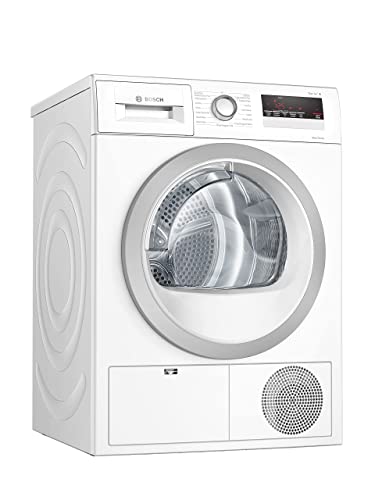A Positive Rant Concerning Washer Dryer With Heat Pump

Heat Pump Washer Dryer - A Revolution in All-In-One Washer-Dryer
A revolution is underway in all-in-one washer-dryers. We've tested 2 large, efficient heat pump units that dry and wash in less than 2 hours and use only 120-volt outlets.
Unlike traditional clothes dryers that blast hot air over your laundry that is bouncing around and let out warm, humid air, heat pump combos cool the air to get rid of the moisture. They also consume less energy than other kinds of dryers, with an average of less than 1 kWh for each cycle.
What is a What is a Pump Dryer?
The heat pump or Drying systems that use ductless cooling cool the air inside and trap moisture. This is unlike conventional dryers that are heated by gas combustion or electric resistance and then blow the warm, humid air through a vent which must be vented outside. They don't require venting out because they reuse heat and moisture inside the dryer.
These dryers are also energy efficient, meaning you can reduce your electric bills. They are also cheaper to run than conventional dryers and last twice as long. Additionally, they are green, which is a big attraction for a lot of consumers.
Heat pump dryers that are ENERGY START-certified are designed to provide the best performance and efficiency. They offer several features that make them stand out from ordinary dryers, including moisture sensors that help stop over drying and stop clothing from shrinking or fade, smart settings that allow you to alter your laundry routine and remote smartphone control.
They are in addition to being more efficient and economical, are also safer because they don't use a dryer exhaust. This eliminates the risk of lint accumulation in the vent and potential fires. They are ideal for apartment dwellers since they can be used wherever.
Another benefit of heat pump dryers is that they operate at a lower temperature than conventional dryers, allowing your clothes keep their shape and color for a longer period of time. However, this means that they could take a bit longer to dry your clothes.
A final benefit of heat pump dryers is that they don't use vents, so they are much simpler to set up than traditional dryers. Heat pump dryers can be put in any room of your home, as long they have access to a drain. They are also quieter and environmentally friendly than traditional dryers. They are an excellent choice for homes with pets or small children.
The dryers with heat pumps have been popular in Europe for a long time, but are now becoming more popular in the United States. With their impressive efficiency in energy and cost savings, it's not surprising why increasing numbers of homeowners are choosing to purchase a washer dryer with heat pump.
What are the advantages of a heat pump dryer?

The heat pump washer-dryers consume about half the energy used by conventional vented dryers. They are extremely energy efficient and can help to reduce the amount of electricity used by homes.
As their name suggests, heat pump dryers do more than simply provide your clothes with hot air - they also eliminate the humidity from them by drawing in dry, ambient air and then reusing the same air throughout the drying process. This helps keep your laundry fresh and helps reduce wrinkles, as well as reducing moisture in your home.
They also aid in dehumidifying your laundry, which helps reduce the burden on your air conditioning system, thereby saving you money on cooling costs too. This is a significant benefit for those living in humid climates that tend to use dryers often.
Unlike traditional vented dryers which release warm, humid air into the atmosphere they use the process of evaporative cooling to get rid of the moisture in your laundry. This results in an energised, cooler environment inside your laundry and is a great alternative for homes that don't have the space or money to accommodate a separate duct for venting out humid air.
A heat pump dryer is less harsh on clothing since it does not require a traditional heating element, like a vented drying system. In fact some heat pump dryers are designed to never reach a maximum temperature which makes your laundry safe and in good shape for longer periods of time.
While the initial purchase price of the heat pump dryer is typically higher than conventional vented dryers, these appliances can help you save substantial amounts of money and energy in the long run. This makes them an excellent investment for consumers that want to lessen their environmental footprint while reducing their utility bills.
As the demand for dryers that heat up has increased in recent years manufacturers have been in a position to make them less expensive than before. In addition the technology behind these dryers has continued to advance, making them even more efficient and user-friendly. These washer-dryers are a great investment, and will help save energy and the environment in the long run.
How does a heat pump dryer function?
When it is time to wash your clothes the typical vented dryer is a simple piece of equipment. A sheet of metal that has a heater, motor and timer. However, a heat-pump dryer is a different species. These dryers are stuffed with advanced technologies that give them energy efficiency.
They are so efficient because they not just dry your clothes, but also recycle the heat of the air back into your clothing. The process begins with a blower that pushes air through fins located on the cold side and then fins on the hot side. It may seem counterintuitive but why would you waste energy cooling the air and reheating it? -- but it's actually an efficient way to reduce energy consumption.
The system reverses the cycle to heat the lint. The clothes are dried in the same manner as a vented dryer but at a lower cost.
Another benefit of heat pump dryers is that they don't need vents and can be installed in any room in the home or apartmenteven small spaces such as closets, bathrooms and bedrooms. They're more adaptable than a washer/dryer combination since they don't require an outside wall for ventilation.
These dryers do not require a vent but they must drain. This can be accomplished making use of a drawer that holds water for two cycles or by connecting a hose to the dryer and letting it run through a window. This is a minor issue in comparison to traditional dryers that require lint screens to be cleaned every cycle and condensation coils to be manually defrosted at least once or twice per month.
They may be a bit more expensive right now than their traditional counterparts. However, the upfront investment will pay itself off through lower costs for utilities. Additionally, a number of states and local utilities provide rebates and incentives to help ease the burden of purchase costs.
How can a Heat Pump Dryer Help Save Energy?
A heat pump dryer recycles its energy, as the name suggests. It requires less energy than conventional electric dryers that are found in most homes. The main reason for this is that it does not directly heat the air. It utilizes the same technology as air conditioning, which is compressing a liquid (like refrigerant) and then heating the resulting vapour. The vapor is then pumped through the drum of the dryer that absorbs it. This aids in drying your clothes.
The second function of the heat pump is to reuse heated vapor flowing back through the drum after it has been dried. This is referred to as an reversible process. The heat pump repeats the process several times, capturing heat over and over again. The heated air is then blown into the building to warm up the building's inhabitants.
Ventless heat pump dryers, unlike vented dryers, transport the humid indoor air through a closed circuit which cools it, sucks out the water, and it drains into a drain for a washer pipe or into the floor drain or sink. This means you can avoid the dryer vent and reduce humidity in the indoor environment, particularly in a tightly sealed building enclosure.
When needed for a particular situation, a heat pump dryer can be utilized in conjunction with an electric evaporator to add hot water to the cooling circuit. This can cut down on energy use by as much as 30 percent.
You should be aware that heat pump dryers are not suitable for every household. The upfront cost of heat pump dryers is higher than that of traditional electric dryers. However, tumble dryer with heat pump operating savings for the majority of families aren't as great. Yale Appliance estimates these units will be appealing to households with high electricity costs and a high amount of use for drying clothes.
That said, there is one very big incentive for a lot of households to think about the possibility of a heat pump dryer because of the government policy. In the United States, you can qualify for rebates that significantly lower the cost of these appliances. The economics of the new laundry appliance is compelling.
